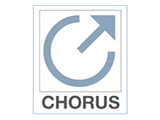
CHORUS (Clearinghouse for the Open Research of the United States), a cost-effective and sustainable public access solution, today issued a Progress Report on its first eight months in full production mode, which also coincides with the period since CHORUS was named by the US Department of Energy (DOE) as part of its public access solution.
“CHORUS is up and running, providing a path to sustainable and scalable public access that delivers on agency goals at no extra cost to taxpayers. We are currently monitoring and auditing public access and preservation/archiving arrangements for about 75,000 journal articles – 24,000 of which are already publicly accessible — reporting on research supported by 22 US funding agencies,” said Howard Ratner, Executive Director of CHOR Inc., the non-profit membership organization of which CHORUS is the first initiative.
CHORUS services and best practices advance public access by streamlining and monitoring public access compliance. CHORUS works across the spectrum of public access policies and in concert with diverse proprietary and public- access license terms, balancing diverse stakeholder needs to enable public access without disruptive consequences or burdensome and duplicative efforts. CHORUS services are free to funding agencies, researchers, academic institutions, librarians, and the public.
As agencies shift their focus to the implementation of announced plans, CHORUS provides a solution that helps research funders address two major challenges: minimizing costs and maximizing compliance. “A critical part of the CHORUS mission is to enable public access at no cost to the taxpayer by building on existing, interoperable infrastructure,” Ratner said. “Similarly, we are supporting compliance directly by removing the burden from researchers and institutions and making the articles available, as stewards of the published literature.”
Since the DOE named CHORUS as a partner in developing its public access solution, several other agencies have also announced public access plans, including the National Science Foundation (NSF) and the National Aeronautics and Space Administration (NASA). The NSF and NASA plans specifically highlight CHORUS as a potential partner to achieve their public access objectives.
“We’ve made substantial progress collaborating with US funding agencies, gaining support throughout the scholarly community, and forging partnerships to deliver our core services and develop innovative new capabilities. Agencies, universities, libraries, publishers, and researchers are together piloting the way forward to advance open science,” Ratner continued. “Open, flexible, and consultation-based policies allow agencies to adapt as understanding of each community’s needs evolves and innovations are introduced as a result of the public-private partnership. As we continue to enhance our tools and services, CHORUS looks forward to collaborating with agencies to accelerate public access.”
CHORUS Highlights, August 2014 – March 2015 (Complete Report)
Funding Agency Collaboration
- Actively engaged with the DOE on PAGES implementation, collaboration that is extending to agencies planning to use PAGES (Public Access Gateway for Energy & Science) – e.g., the NSF.
- Named by NASA as a potential partner for second-phase of public-access plan implementation, and in discussions with other agencies whose initial plans identify solutions other than CHORUS.
- Setting up proof-of-concept pilots to showcase benefits of CHORUS’ distributed-access approach, which include minimizing both the administrative burden on authors and the creation of inconsistent versions
- Provide dashboard monitoring of research content submissions at 22 US funding agencies. Developing additional capabilities, including providing links to related data and information about public accessibility dates within search results.
- Monitor and report on US Agency Public Access Plans
Rapidly Growing Wealth of Content:
- Member publishers are now routinely and systematically identifying content with CrossRef’s FundRef tags, adding reuse license information and making content publicly available on their platforms.
- Audited approximately 75,000 member articles for public-access availability – 24,000 are already freely accessible to the public ahead of any mandate. This data is reported on publicly accessible CHORUS agency dashboards. Began development of dashboard services for publishers
Scholarly Community Support:
- Launched with the support of more than 100 signatories, representing the publishers who collectively produce the vast majority of peer-reviewed journal articles.
- Launched Membership Drive, signing on 22 Publisher and Affiliate Members, more than two-thirds of whom are non-profit organizations
- Sponsored multiple workshops and working groups, facilitating important peer support network in which new ideas are developed and nurtured.
Partnerships:
- Signed agreements with Portico (August 2014) and CLOCKSS (March 2015) to make special arrangements available to Publisher Members to ensure perpetual preservation and public access – a unique CHORUS benefit that guarantees brightening publicly accessible content if/when it becomes unavailable.
- Exploring bi-directional article connections to data repositories by collaborating with array of innovative, cooperative open data initiatives, such as the CrossRef–DataCite Pilot,SHARE, and the RDA-WDS Publishing Data Services Working Group, and potentially, theRMap Project, Dataverse, figshare, and Dryad.



























